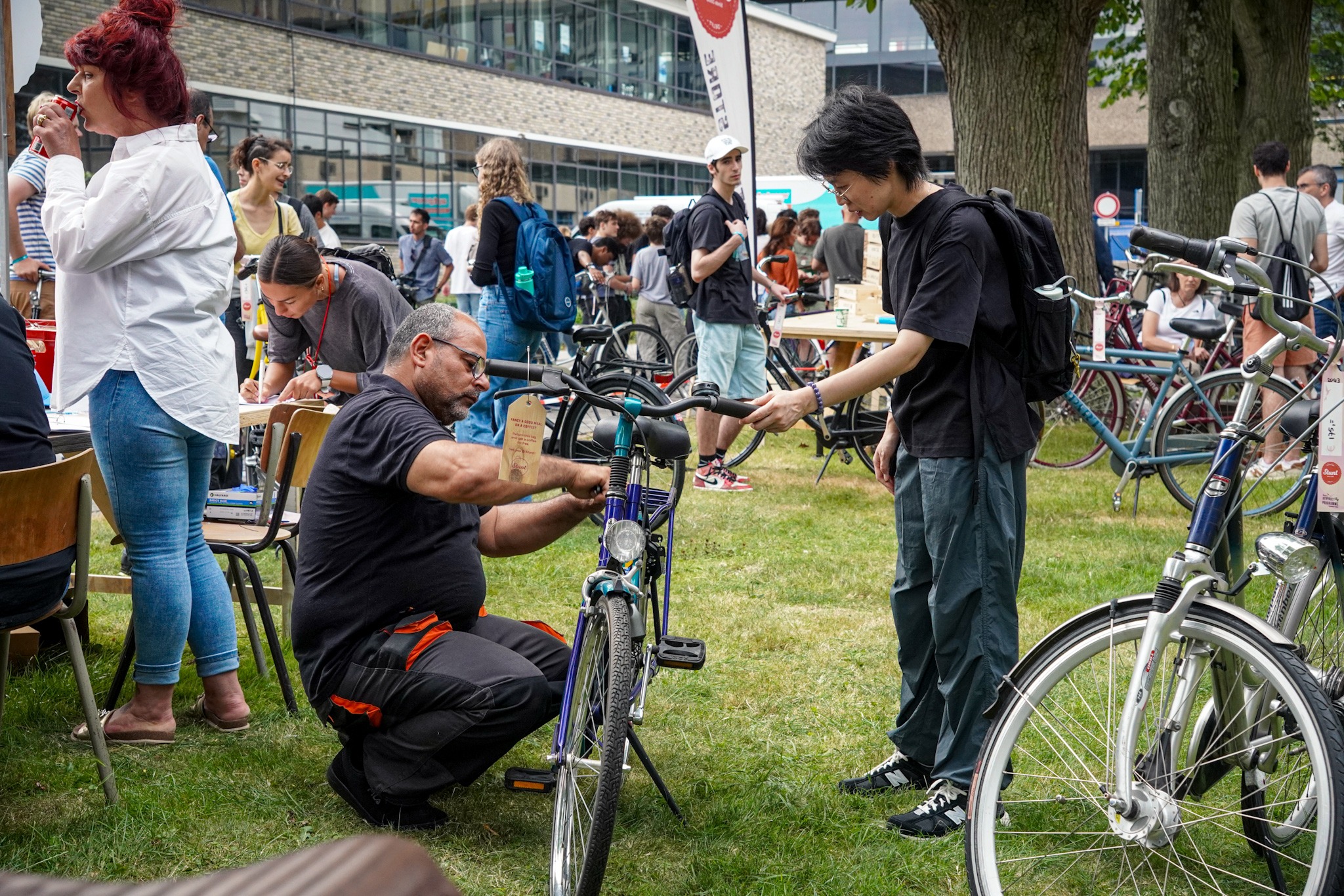The secondhand bicycle sale has been a regular event on the Introduction Programme (IP), the introduction week for master students. “Is my bike not a touch expensive?” a lot of internationals wonder.
(Photo: Thijs van Reeuwijk)
“That’s a male bike and that’s a female bike.” With wide arm movements a Dutch student spontaneously gives a lesson on the different types of bicycles to international students. There is a sea of secondhand bicycles on a patch of grass next to the Echo academic building. The bikes were brought to campus in huge numbers for the fifth consecutive year to be sold as part of the Introduction Programme (IP), the introduction week for master students. Helped by 73 mentors, the 1,235 mostly international students that have signed up for the IP will be steamed through a programme to get to know the city of Delft, TU Delft, and life in the Netherlands. Preferably on bicycles.
TU Delft’s Education and Student Affairs Department, that organises the IP, invited five companies in Delft to hand over their secondhand bicycles. The prices have been written in waterproof ink on labels attached to the hundreds of parked bicycles. The average price of a velocipede is around EUR 150, with exceptions ranging from EUR 75 to over EUR 375.
‘Delft is so small that you could do everything on foot’
James from China has just got himself a matt black bicycle of an unknown brand. “Can you raise the saddle?” he asks the seller. James came to the bicycle sale by himself as his mentor group have gone on to the city centre. In his place of birth he travels on his racing bike once in a while. He sees cycling as the perfect way to get around in the Netherlands. “It is faster than walking, though Delft is so small that I can also do everything on foot.”
He has been in the city now for five days. What is his initial impression? Life is quiet and slow paced he says. Very different to the busy and rushed metropolis of Shanghai where he was born and raised. “Though I don’t yet know what the pace of my Computer & Embedded Systems Engineering master’s will be. Who knows, maybe I’ll be singing a different tune then.”
James opted to do a master’s in the Netherlands as he had had positive experiences in Europe as an exchange student. He chose the Netherlands as people here “speak such good English” and TU Delft because it scores high on the QS World University Ranking. The latter will make him attractive for employers in China where the competition on the labour market for young people is currently deadly.
Postcode Lottery bicycle
A little further on, a student is scanning a row of bicycles. Her eye falls on a Postcode Lottery bicycle. The price: EUR 175. “Is that not a bit pricey?” she asks a fellow student who shrugs her shoulders. The price of the bicycles is a recurring subject. “I was warned that the prices are high here and that it would be better to buy one on Marktplaats (a secondhand online market place, Eds.),” Janis from Latvia quietly tells the reporter. “But I hear that swindlers use Marktplaats so you need to be careful who you buy from.”
Rihardhika from Indonesia too wonders if he has made a good deal. He just joined a long queue to pay EUR 160 for a blue-grey Gazelle bicycle. “I don’t know what the normal price is here, and to be honest, I don’t really know what I should be aware of when buying a bicycle.”
‘Cycling in the Netherlands seems relatively easy’
Rihardhika will do a master’s in Sustainable Energy Technology and hasn’t “ridden a bicycle in quite a long time”. He found a studio in The Hague and will mostly use his bicycle to go from the station in Delft to campus. He does not think that cycling in the Netherlands is that complicated, and certainly when he compares it to traffic in Indonesia. “There are no separate cycle paths there, drivers are not used to cyclists, and apart from cars there are scooters everywhere. It can sometimes take an hour to go five kilometres because the roads are so busy.”
Cycling in the rain
Once in a while a student cycles away from the queue, some of them wobbling and others in a perfectly straight line. Samhita from India, who will study Management of Technology, has just tested an orange bicycle. She is unsure whether or not to buy the bicycle. “It’s a bit big.” There are 16 people in her mentor group, including students from China, the United Kingdom, Greece and Switzerland. “A lot of different cultures, but we blend well.”
Samhita came to Delft because she “heard good things about TU Delft” from former fellow students at Pune University where she did her bachelor’s. She has been here now for three days and is intending to do the cycling workshop, which is also part of the IP. “Cycling is part of the Dutch culture, so I want to do it as much as I can while I’m here.” The last time she rode a bicycle was about five or six years ago. She hopes that after the cycling workshop, cycling will go well. “Except when it rains. I think cycling in the rain must be really hard.”
Do you have a question or comment about this article?
a.m.debruijn@tudelft.nl


Comments are closed.